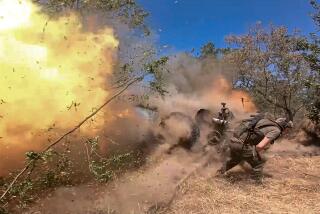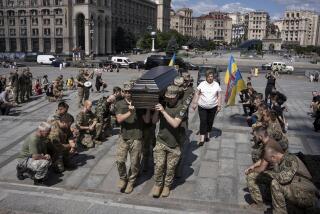At least 9 slain in deadliest day of three-month Ukraine crisis
KIEV, Ukraine -- At least nine people were killed Tuesday in the deadliest day of the 3-month-old Ukrainian political crisis as security forces clashed with demonstrators and later stormed their encampment at Kiev’s Independence Square, local and international media reported.
Live television coverage carried by the Russia-24 news channel and nine live-streaming video cameras at the protest site and relayed by Ukrainian opposition broadcasters showed fiery explosions illuminating the grimy tent city in the capital after demonstrators ignored a warning from police to clear the square.
Clouds of smoke from fires and tear gas could be seen wafting over the chaotic scene, eerily backlit with an orange glow from the multitude of blasts, burning sandbags and smoldering debris.
Security forces began moving against the protesters’ camp with water cannons and stun grenades after giving them 15 minutes’ warning to leave.
But thousands of protesters remained in the square despite the caustic gas engulfing the nerve center of the uprising against President Viktor Yanukovich.
Opposition leaders told journalists in Kiev that they had requested negotiations with the government to defuse the escalating violence, and that Ukrainian leadership had agreed to meet with them Wednesday. However, police continued to set fire to the protesters’ tents and barricades well into the night.
Antigovernment protesters have besieged the capital and key government buildings since late November, when Yanukovich unilaterally abandoned an association agreement in the works between Ukraine and the European Union in favor of maintaining close economic ties with Russia.
Opposition leaders had reported three deaths among protesters before the square was stormed about 8 p.m. An Interior Ministry report issued late Tuesday said two policemen had been killed in the clashes, as well as an official of the ruling Party of the Regions and six protesters.
Opposition lawmaker Oleksandr Bryginets reported three more protesters dead as a result of the later police attack on the square, although there was no immediate government confirmation of that higher toll.
Kiev officials appealed to protesters to stay away from the square “to avoid casualties” and authorities closed metro stations providing access to the area.
The surge in violence followed a short-lived amnesty agreement fulfilled over the weekend when authorities released the last 234 detained protesters and promised to drop criminal charges against them. In exchange, the opposition vacated Kiev City Hall and removed some barricades blocking traffic to the streets around the Supreme Rada, the national parliament.
Still vowing to press on with their demands for Yanukovich’s resignation and parliamentary action to curb presidential powers, protesters marched toward parliament on Tuesday afternoon to press for restoration of the 2004 constitution that was amended after Yanukovich was elected in 2010.
The demonstration turned angry when the Party of the Regions postponed debate on the legislative changes demanded by the opposition and police tried to block the estimated 20,000-strong procession from entering the parliament building. Some managed to penetrate the security cordon around the legislature as well as the Party of the Regions headquarters, Kiev’s Channel 5 news reported.
Marchers pulled cobblestones from the streets to hurl at police, who tossed tear gas back at the protesters, Associated Press photos and BBC news coverage showed. Russia-24, which, like other Kremlin-controlled media, has cast the unrest in neighboring Ukraine as the actions of radicals, showed the escalation of violence under headlines proclaiming “revolution” and “massive disorder.”
The short-lived easing of tensions during the amnesty apparently fell victim to renewed signals from both sides that they intended to press on with their fight over the future of Ukraine.
Russian Finance Minister Anton Siluanov had announced Monday that Moscow would buy another $2 billion in Ukrainian bonds, part of a promised aid infusion of $15 billion in loans and energy subsidies. Protesters see the Russian bailout as an attempt to buy Yanukovich’s loyalty and allegiance to the Eurasian Union, a Moscow-directed economic alliance that Russian President Vladimir Putin has been touting as an alternative to the European Union.
Moscow had already bought up $3 billion in Ukrainian debt but put the rest of the rescue plan on hold last month after the resignation of Ukrainian Prime Minister Mykola Azarov. The government chief stepped down in the face of demands by the protesters, who took his departure as an indication that Yanukovich would concede to their demands for a multiparty interim government of technocrats.
The holdup in Russian bond-buying has been denounced by the opposition as pressure from Moscow for Yanukovich to defy the protesters’ demands for his resignation and early presidential elections.
Moscow and Washington have accused each other of trying to influence the course of Ukraine’s political future. The blame game took on new force Tuesday when a senior Russian Foreign Ministry official accused Washington of “puppeteering” on Ukraine’s political stage.
The United States is trying to impose a “Western vector of development” on Ukraine, ministry spokesman Aleksandr Lukashevich told Russia Today television. He criticized an intercepted conversation between two top U.S. diplomats last week in which they discussed their preferences for which opposition leaders should take key government positions in an interim Cabinet.
Lukashevich called the clandestinely taped conversation between Victoria Nuland, the U.S. diplomat in charge of European affairs, and U.S. Ambassador to Ukraine Geoffrey R. Pyatt as “casting” for roles in the next government.
He also recalled in comments to the news agency RIA Novosti a recent statement by U.S. State Department spokeswoman Marie Harf hailing the Friday release of detained protesters and calling on the Yanukovich leadership to swiftly agree to “a multiparty technical government, with genuine power-sharing and responsibility.”
Twitter: @cjwilliamslat
Special correspondent Butenko reported from Kiev and Times staff writer Williams from Moscow.
More to Read
Sign up for Essential California
The most important California stories and recommendations in your inbox every morning.
You may occasionally receive promotional content from the Los Angeles Times.










